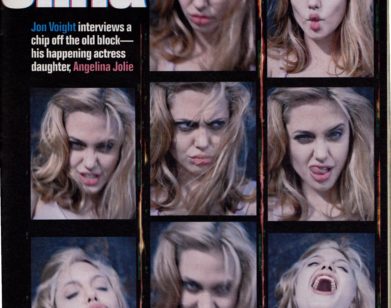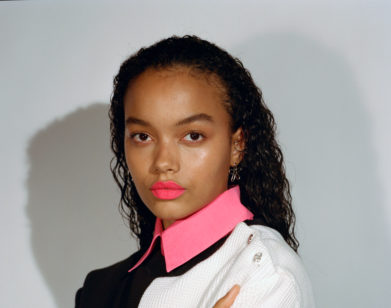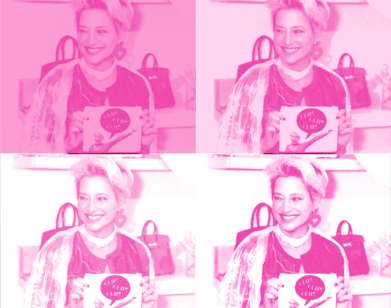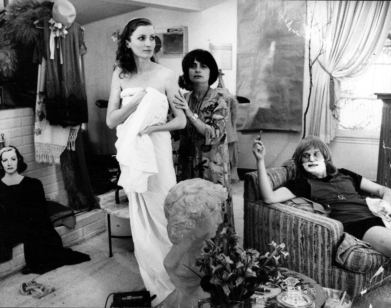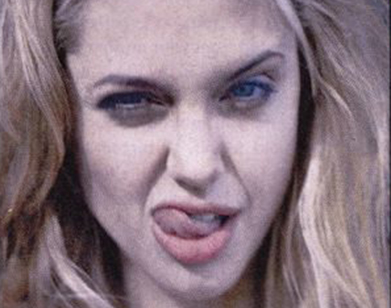BACKSTAGE
Danya Taymor and Angelina Jolie Take Us Inside The Outsiders
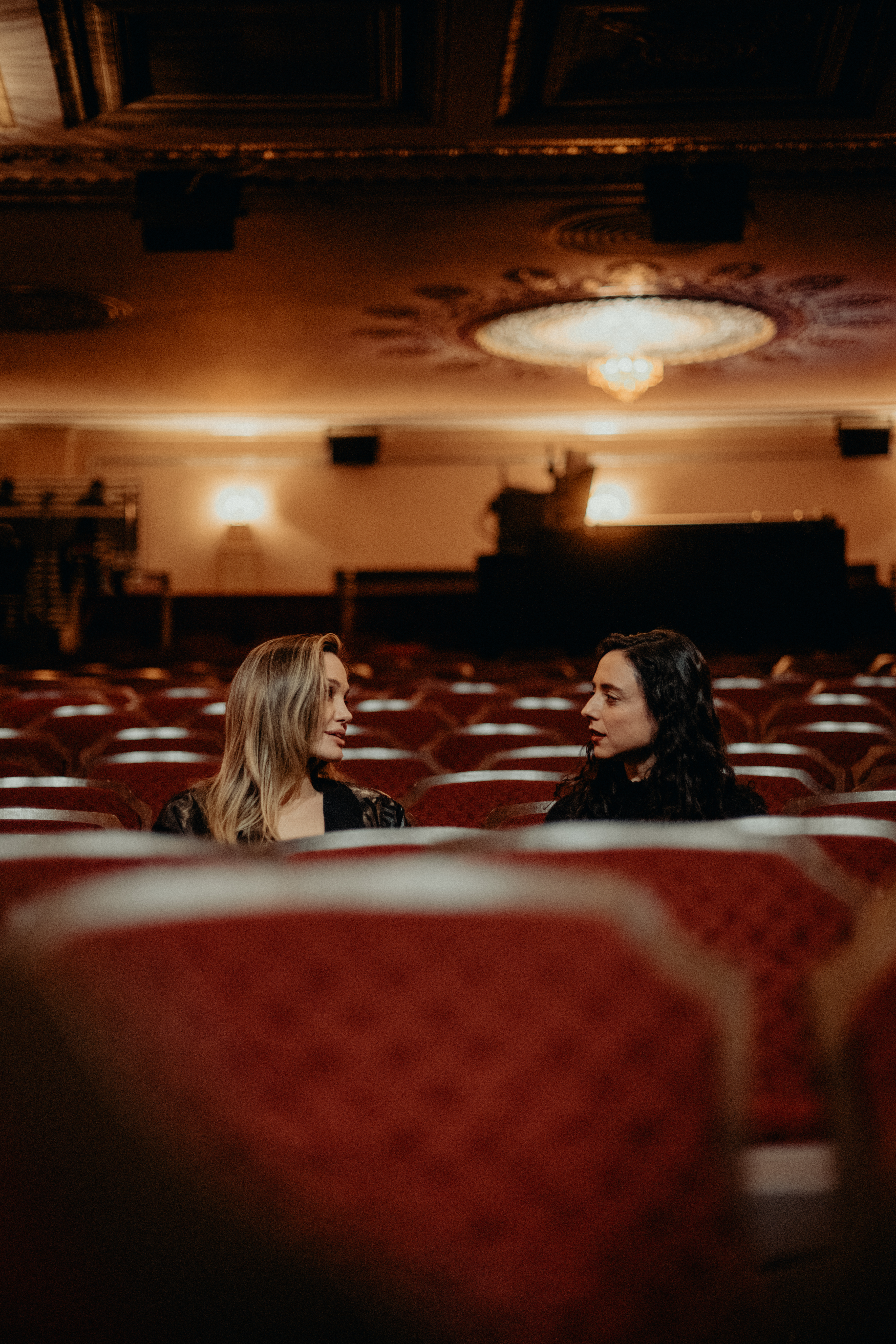
“In order to be able to push any artist to an extreme,” says the director Danya Taymor, “you get the best results by earning their trust first.” It’s a philosophy that’s proven particularly useful in Taymor’s latest effort: the muscular and ambitious musical adaptation of S.E. Hinton’s seminal coming-of-age novel The Outsiders, which opens on Broadway’s Bernard B. Jacobs Theater tonight. The story, by now, is well-trodden, following the disaffected boys in a pair of rival gangs, the Greasers and the Socs, in Tulsa, Oklahoma in 1967. But despite having been adapted twice—by Francis Ford Coppola in 1983, and again for television in 1990—Taymor’s version, with a punchy book by Adam Rapp with Justin Levine and arousing, folk-pop music by Jamestown Revival and Levine, is primed to introduce it to a new audience.
Angelina Jolie, who came on as a producer after seeing the world premiere production at the La Jolla Playhouse last spring, couldn’t be more thrilled. “It’s such an extraordinary study of man through the eyes of a young girl who clearly had so much love and affection and understanding [for them] at such a young age,” the actor says. “We see them at their lowest, we see them trying, we see them loyal, we see them loving, we see them broken, we see them violent.” Last week, as the cast put the finishing touches on the show (and the aftershocks of a 4.8-magnitude earthquake echoed through New York City), she and Taymor got together at the Bernard B. Jacobs Theatre to talk about building character, embracing collaboration, and why The Outsiders stands the test of time.
———
DANYA TAYMOR: Did you get to see any of our last little rehearsals?
ANGELINA JOLIE: Was it emotional?
TAYMOR: Yeah, even though it’s not the end, it can feel like that.
JOLIE: It’s the end of a chapter.
TAYMOR: It is, but I think that can feel sad. The new moon is going to happen next week, so I feel like we’re aligned. But yeah, it was emotional. We did our last warmup and our last mirror. Everybody led one. Sometimes I do them in partners, but this was a big circle.
JOLIE: Well, let’s talk about that, because that’s such an unusual thing you do as a director. I’ve watched the effect it has on all of the artists. How did you come to that process?
TAYMOR: I started at this little theater called The Flea, and I was doing a play about two sisters in Colorado. I had these great, very New York City actresses. I was like, “We’ve got to get in our bodies if they’re going to feel like they live on this farm where they’re crutching sheep asses.” So I started doing a physical warm-up. And because they played sisters, I thought, “These girls who are not related need to really know each other.” That’s when I started doing mirrors, where you have eye contact and one person leads, and the other follows. And then, over time, through assisting other directors or working in different spaces, I’ve sort of accumulated other things that have made it into the warm-up. There’s an amazing thing called Memory Play I learned from an Israeli director. It’s Tadeusz Kantor’s method, he’s a Polish director. He asked people to give memories, and then you pick two of the memories and make little plays with them.
JOLIE: With no words.
TAYMOR: With no words. It’s a way to get to know one another and to learn how to touch each other’s bodies with consent, so that when you have to do it on stage, you have a familiarity and you can be free.
JOLIE: It’s the things you’ve done like that that have made this such a community, because this really could have gone so many different ways. You have so many young people on that stage doing so much work, and it’s really, really challenging work, some of the most difficult work I’ve ever seen. But you’ve nurtured them, you’ve pushed them. You’re a very strong director. I’ve noticed that.
TAYMOR: Thank you.
JOLIE: But equally, you’ve been like, “I want to make sure you’re safe and feel good about this and know that this is within you, but I’m going to push you so you can discover something or go somewhere you’re not comfortable.”
TAYMOR: In order to be able to push any artist to an extreme, you get the best results by earning their trust first.
JOLIE: Right.
TAYMOR: I remember being an actor in college and being laughed at by a director and it made me want to shut down. I was actually unable to do the thing they wanted me to do. It’s a feeling that stayed with me because it did the opposite of what the director wanted. I think about that a lot, because I do want to push people and be rigorous and demand excellence, but you can do that in a joyful and healthy way, where people feel taken care of.
JOLIE: The moment last night, where they come off stage and they see you and they have such a big smile and they hug you, it’s such a beautiful relationship. This material needed it. I think that’s why it’s so successful, because everybody’s so deeply truthful up there.
TAYMOR: It’s not tangible, but it’s arguably the most important thing. You want everybody to have skin in the game and feel responsible, like it’s theirs, and not like they’re just a prop inside of it.
JOLIE: It’s so clear that they do. Everybody has their moment. And you’re not just doing it to do it. Some people give an actor a moment so they have a moment. But you have the storytelling and the understanding of who these different people are, why these different characters are so essential to the story and the world of the show. And then you have special moments that really suit them, which is beautiful. The best directors I’ve worked with have understood me and the character enough to help us become one.
TAYMOR: You have to fuse. It’s a big ask, because you’re asking them not to put armor between themselves and the character, and that can bring up some scary stuff. But fusion is what excites me so much about acting as an art form, especially in the theater. For them it’s cool to feel ownership of this character, of their arc in this world.
JOLIE: It’s your first musical. I know you study a lot and you’re smart with who you surround yourself with, but there must’ve been times you felt a bit daunted or unsure. Were there particular areas you felt you had to give extra focus?
TAYMOR: I think the size of it is well beyond a play, because you have way more high-level collaborators. In a play, it’s you and the playwright. Here, it’s you and the book writer, the composers, the choreographers, the music director. It’s just huge. But I love collaboration, and it’s a big reason why I’m a director in the first place. But there were a few times where I was like, “Who’s in charge? Oh, fuck, it’s me.”
JOLIE: “Who’s going to manage this?”
TAYMOR: Yeah. Another thing I learned, and not in a cocky way, is that the way you walk into a space when you’re the director matters so much. So even when you’re feeling challenged, if I come in with a good, forward-moving attitude, we’re going to do better work. If I come in pissed and irritated, we’re going to get less done.
JOLIE: That is a big thing to learn, and it’s very, very true. Even though we know that, it’s hard not to get frustrated, especially when you’re trying to move the ship forward.
TAYMOR: Definitely.
JOLIE: I’m not the most patient person. [Laughs]
TAYMOR: Me neither. But I’ve become more patient because we get results. It’s not always easy, but at least a musical is less lonely than a play. I’ve got Rick and Jeff [Kuperman], the choreographers. When I’m really weak or feeling tired, I could say, “Hey, guys.”
JOLIE: “Can you take over?” And this is from having never directed a play, and certainly not a musical, but I’ve been amazed by so much of what you have to decide with everyone, the music, the edit, the cue. You have to decide where you throw the audience’s focus, when the music starts, where you cut, where you leave the pauses, the pacing, the tone, all these things that you usually have time for in other genres. You’re all making this beautiful thing together. You’re all speaking such a strong language and coordinating so much at the same time. To then have that effect and move the story forward has just been amazing to watch and to experience.
TAYMOR: And to your point about when edits happen, in theater your edit happens live, in front of people, which is excruciating but amazing. It’s a different job than directing a film, because in a film, you want to get everything you possibly can, and then later you’ll decide how it all works together and what the rhythm of it is. You may have hunches, but that could change. In the theater, and especially in a musical, you have so much and so little control. One thing that’s special about our musical is the use of silence and stillness. We can only have silence because we have noise or music. You can’t create silence out of silence.
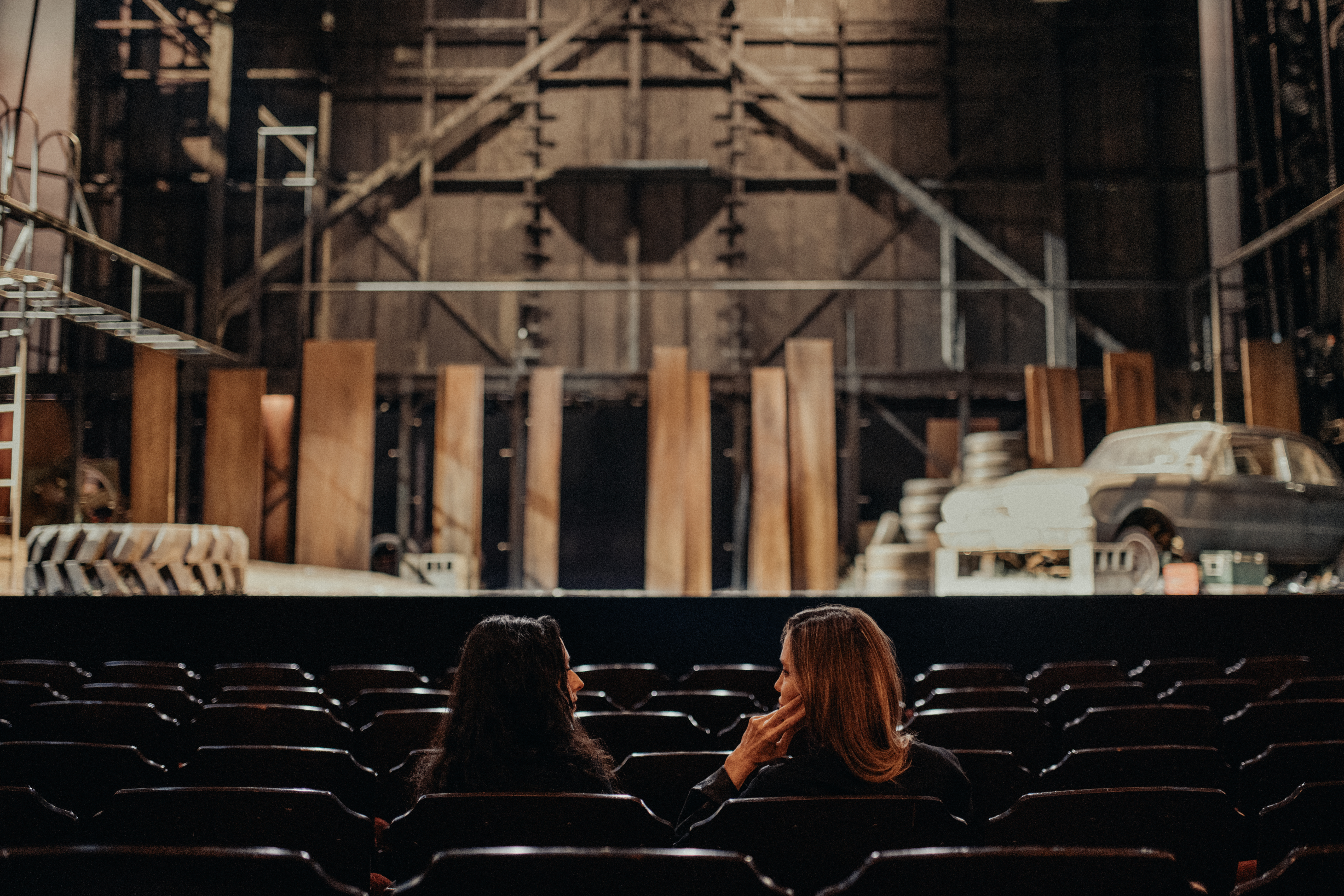
JOLIE: [Pauses] We might be having another earthquake.
TAYMOR: I felt that. Does it feel like an earthquake or does it feel like a train? It’s crazy that New York is having an earthquake. The world is so out of balance.
JOLIE: I know. Anyway, the teenagers are real, and that’s why it’s been so relevant for so long. They want to have conversations, whether it’s talking about an earthquake in New York or anything. There’s so much happening around them, that to meet them where they’re at and have stories that are helping them see how others move through loss, suicide, violence, bullying, poverty, pain, racism, is essential. It’s important to witness and be exposed to stories that talk about some of the realities of life without simplifying or softening them. A lot of young people, like the ones we saw last night that were so emotional about it, need to be able to have these discussions.
TAYMOR: Definitely. I was Ponyboy’s age when I lost a very good friend to suicide. And while we wish that young people didn’t experience violence or loss or abuse, they do. I’ve thought about my friend a lot while making this. I’m thinking, “Oh wow, this wouldn’t have made it better or made it go away, but it could have helped me move through it because it can feel so isolating if you have violence in your home or you have experienced loss.” It’s a gift that Susie Hinton’s book gave to so many people.
JOLIE: Yes, absolutely. I’m very excited for people to see it.
TAYMOR: Me too.
JOLIE: I think when people hear that it’s a musical, it doesn’t make sense to them, right? People say, “How is that a musical?” And you can completely understand why that would be very challenging to do. It clearly is. I’ve watched you all wrestle with finding the tone, finding the balance. At every turn, when there was a choice to be made, you always made the harder choice, which is such a credit to you as a director and to every single artist that’s around this.
TAYMOR: Thank you.
JOLIE: You really did. I had times where I was nervous for everyone, even physically. Or I thought, “Could that need be met emotionally every night? Are they ready to take on any more?” But I love that all of you decided that that was the way this was going to be done.
TAYMOR: Well, that takes me back to the warm-up and building of the group. For Ponyboy, for instance, every night he has to go through so much. But at the end, he’s always going to sit down at a table with his brothers, so you know that even though you have to go through this tremendous grief, there’s a place where you’re going to land softly. I’m trying to build something that can be repeated but also be alive, which is a crazy contradiction. It’s impossible for it to be the same every night, so I want to encourage liveness. I think it can also help to think of it as a ride. You’re like, “Oh, fuck. I messed up this part of the ride.” Well, where’s the next place that you can get back on so you don’t become demoralized?
JOLIE: That’s so wonderful. That’s a big gift to be able to give an artist and a person. You’re allowed to be human and you’re allowed to have bad days and be imperfect.
TAYMOR: And when you ask people to be as exposed as I’m asking these actors to be, you do have to give them softness, a way to refill or to protect themselves. Early on, when I was doing intense material, I didn’t know as much about how to build care inside the system of the play. I remember doing a play and watching an actor’s light as a human being go out. The performance was amazing, but they were sad.
JOLIE: It’s a big deal for you to see that. I can tell you, as an artist, I’ve been in a place where I’ve felt like it was just me taking care of myself. You’re pushed, you’re drained. They’ll pull crazy out of you, they’ll pull pain out of you, but they don’t put you back together. It’s taken me getting older to be able to better find that balance for myself.
TAYMOR: It’s hard.
JOLIE: That’s such a gift to give them. Maybe it was you who said this to me, about the view of men in this piece. It’s written by a woman, and now directed by a woman, but The Outsiders is such a beautiful way to see and understand men. I think it’s very true to life. I love these men, and my daughter does, and you do. Why do we love these men? They’re not perfect. We see them at their lowest, we see them trying, we see them loyal, we see them loving, we see them broken, we see them violent. It’s such an extraordinary study of man through the eyes of a young girl who clearly had so much love and affection and understanding [for them] at such a young age.
TAYMOR: Yeah, she did. She also had compassion. Something I think about a lot is that the outsiders are not just the greasers. She sees why even the characters you would think of as the villains are the way they are, how wealth and power and privilege can actually corrode the person who holds it.
JOLIE: Right.
TAYMOR: I think that’s why people really love Kevin [William Paul’s] performance as Bob, because it’s real. He really isn’t trying to be “good.” The only way he knows how to feel is through violence. We don’t know what his home life is like. There’s something so profound about Susie [Hinton’s] mind, that she was curious about that. It’s an amazing story because it appeals to people across age, race, class, gender, and political ideology. The material is so open. I think there’s a chance that really different kinds of people could all end up in the same place, which is very rare right now.
JOLIE: And very necessary. Somehow, you’ve managed to do all of that and make it one of the most entertaining—
TAYMOR: That’s not a bad word.
JOLIE: It isn’t a bad word. It’s intense and it’s dramatic and real and authentic and grounded, and it’s also very entertaining. That is very, very hard to pull off. I think it’s extraordinary what you’ve done. When I see someone sitting in their pain, I’m not as moved. But when I see someone still trying to live, still trying to laugh, still trying to rise above it, that’s always very moving.
TAYMOR: Yes, there’s a great Chekhov stage direction which is “through tears.” Not “in tears,” but through tears, which I find so active. I thought about that a lot when directing these painful scenes. You’re trying to move through, you’re not sitting in this.
JOLIE: No.
TAYMOR: Rarely do we just sit in it.
JOLIE: No, but acting sometimes can feel like that.


